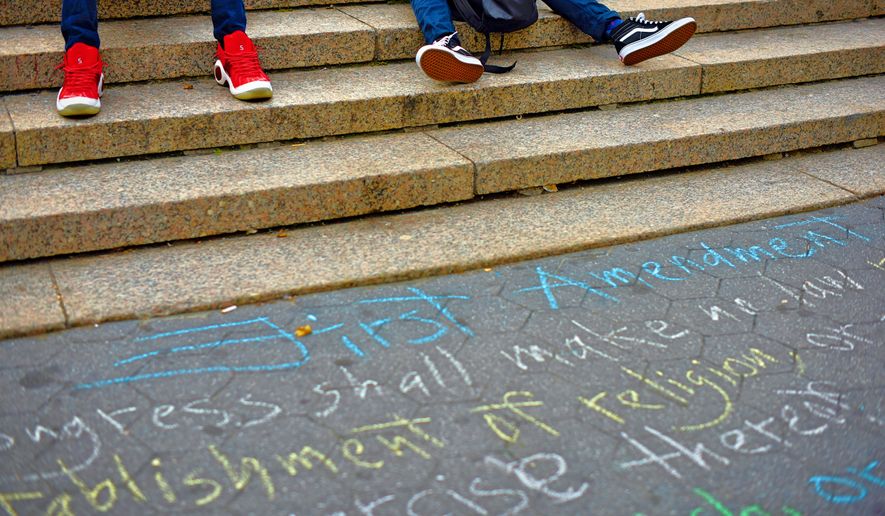The Institute for Free Speech has given 43 states failing scores in its new Free Speech Index, underscoring the opposition facing people wishing to speak openly about politics and government nationwide.
Institute for Free Speech President David Keating said citizens would need to hire an attorney to navigate laws in most states to advocate for better government.
“If these were classroom grades, more than 40 states would fail,” Mr. Keating said in a statement. “To put it simply, legislatures across the nation have regulated too much speech by too many groups.”
Just three states — Wisconsin, Michigan, and Iowa — scored more than 70% of the possible 1,000 points in the first-ever Free Speech Index, which rated the states on how well they support the speech and association rights of groups and individuals.
Wisconsin garnered 86% of possible points, Michigan amassed 77%, and Iowa notched 75% of available points.
The three worst states were New York, 15%; Connecticut, 18%; and Washington, 22%. New York rates poorly for its regulation of free speech near an election, for example, and for its unclear definition of what constitutes a campaign “expenditure.”
Institute for Free Speech spokesman Luke Wachob said 60% is considered the lowest passing grade in most schools, so 43 states fail by that measure.
“Every state has at least one blatantly unconstitutional law on the books, and most have many such laws,” Mr. Keating said.
States featuring Republican- and Democratic-dominated governments each showed poor results. Florida and California ranked 43 and 44, respectively, out of the 50 states.
The Institute ranked the states in ten categories where state law burdens speech of people and groups, including issues involving lobbying, electioneering, coordination, and campaign finance. The Institute, started in 2005, aims to roll back the regulation of political speech.
Bradley A. Smith, the Institute’s founder, wrote in the report that laws regulating political engagement are often presented as necessary for good government, but the complex legal regime makes it difficult for people to evaluate the free speech mood in the states.
“In some important ways, our speech has never been more highly regulated,” Mr. Smith wrote. “Though campaign speech is often portrayed as a ‘wild west’ with no rules, in fact, arcane campaign finance regulations govern the minutiae not only of almost every campaign, but of what ordinary citizens and the groups they belong to can say and how and when they can say it.”
The report recommends a simple starting point for improving the free speech climate: follow the constitution.
“Forty-five states have statutes that are of questionable constitutionality and would likely not survive, if challenged in court,” the report said. “Many of these statutes have already been ruled unconstitutional, yet they remain on the books, chilling potential speech and activity. Eliminating these provisions will improve the ability of groups and citizens to make their views known.”
The report includes individual report cards for each state totaling more than 100 pages of the report, which Mr. Smith said he hoped would be a tool for citizens to evaluate their states and hold government officials accountable.
• Ryan Lovelace can be reached at rlovelace@washingtontimes.com.




Please read our comment policy before commenting.